#I’ll get run up on by a clown car and get beaten to death down w cis style but by clowns rather than strawmen
Explore tagged Tumblr posts
Text
I had a dream that I was being strangled by a unicorn and when I woke up the sleeve of my unicorn onesie had wrapped itself so severely around my neck that I was actually having trouble breathing. I think when I die it’s going to be bc of some looney tunes bullshit like that…like an anvil is going to fall on my head one day and that’s how I’ll die
#or someone is going to drop an entire grand piano out of a window directly onto me#I’ll get run up on by a clown car and get beaten to death down w cis style but by clowns rather than strawmen#I’m going to accidentally walk off of a cliff and I’ll have a moment where I’ll hold up a little sign that says yikes midair before I fall
2 notes
·
View notes
Text
Dragon Blood (Blue Bloods Inspired Dragonball Z AU) [Intro]
Okay so I caved and wrote this up for that Police-ish/Gangster-ish Blue Bloods-Inspired DBZ AU I wrote about a little bit ago.
This is meant as a teaser/trailer. If anyone wants to commission more scenes from this universe, all you gotta do is shoot me a message and we can take about it.
For now, I’ll let this be only continued through commissions, but if everyone likes it enough, I might be able to work something out. Who knows?
Anyway, let’s get to the story, alright?
Hope you guys like it!
God Bless and Good Day!
~The Lupine Sojourner
It only took a moment.
Sounds so cliche to many people, but for two siblings, it was a nightmare come true.
One minute, they are having dinner with their mother, eagerly awaiting their father’s return, having talked (badgered, really) their mom into letting them stay up just until they can hug and kiss their dad when he walked through the door.
The next minute, there was a knock at the door. Neither sibling saw the worried look on their mom’s face. Neither sibling was prepared for police officers to answer the door when they swung it open, expecting their father, forgetting that he never knocked.
Sarada had to be held back since she was too young to take in the different clothes as Vegeta grabbed her. “Dummy, that’s not dad!” Vegeta grumbles as their mother takes Sarada from him.
“But...where’s daddy?” Sarada asks, missing her mother’s wince and the officers’ teary eyes. They’d always hated this part of the job, like most cops.
“Vegeta...Vegeta, take your sister upstairs.”
“But mom- -”
“Go!” The tone of their mom’s voice was enough to get Vegeta to take his five-year-old sister’s hand and all but drag her inside. If his mother was worried, he had to obey her and quickly.
The woman was sat down in the living room and informed that her husband, who hadn’t come home the previous night, was found in a large meat freezer, parts of his body sustaining severe frostbite from escape attempts or possibly being wet when locked inside.
She broke down sobbing and there was nothing the officers could say or do, so they offered condolences and ‘anything you need’ before departing.
Vegeta knew enough to know that he should take his sister to his room and turn on the TV, promising to keep an ear out for their father, neither fully understanding yet that he was never coming home.
Their mother was grateful her son was mature enough to give her privacy, but heartbroken he had to grow up this fast.
And now...he’d have to grow up even faster. Sarada, too.
God, what was she gonna do now?! She was a nurse! She couldn’t support her two kids and herself on that salary. But...she had to try. For her kids.
She had to keep going. She had to.
=#=#= (approximately 15 years later) =#=#=
“Meet the newest officers of the WCPD! West City thanks you all for answering the call to serve this city we all love.” Finally, Sarada’s dream had come true.
Finally, she was able to make progress on the path to bringing the Frieza Force cartel down and getting justice for her father’s murderer.
Finally, she was an officer in the West City Police Force.
Sarada didn’t stop smiling all the way home, where the smile dimmed a little. She’d barely seen Vegeta at her graduation, but...he had been there so maybe she wouldn’t be snippy with him. “Hey, I’m home!” She calls, as always, slipping off her shoes and smiling at her brother as he comes to get a look at her in her uniform.
“So, it’s official. You’re finally holier than me, not that you weren’t already with the whole church-going routine.” He gripes, examining the uniform with hardly approving eyes.
Sarada lets out an exhale, smile now gone. “C’mon, ‘geets. You know that’s not what this is about.” It didn’t matter that this must have been the hundredth time this same discussion had happened this month.
It only seemed to matter that it hadn’t gotten through to him yet.
“Look, you know I support you following your dreams and shit, but you’ve never approved of what I do, either.”
“It’s illegal, Vegeta. I knew that before I even thought of being a cop.”
“Don’t lie to me, sis! You’ve wanted to be a cop practically since- -” Neither Sarada nor Vegeta ever actually verbalized that night if they could help it. It was too heavy a weight, even now.
“Underground fight rings are illegal.”
“Then why are they still around?” Sarada closes her eyes, trying to remain calm.
“Look, Sunday night is tomorrow.” She went over at least once or twice a month to a Sunday dinner with the Commissioner (who used to be her father’s partner) and his wonderful family.
“What? You want me to be lambasted and lectured passive-aggressively about my choices? Hell no. Rather die.”
“C’mon! I’m never treated with anything- -”
“No, cus you’re the perfect angel in the family!”
Sarada was not about to take sarcasm and mockery that laying down. “Alright, that’s going too far and you know it, Vegeta! I made a choice! I made an effort to actually do something about my trauma and past instead of allowing the people that- -instead of getting the shit kicked out of you on weekends in illegal fighting rings!”
“And if I ‘made an effort’ it wouldn’t be taken with anything but snide remarks and passive-aggressiveness! I do still have my pride, you know!”
“Are you serious?! I still have my pride! I took my life and I made it better! And I’ve been offering and trying to get you to do the same! I was welcomed into the fold! You can be, too! We can- -”
“And I keep telling you to back your ass off on that!”
“Why?!”
This was, perhaps, when they’re fights almost literally got bloody.
When Sarada even insinuated that Vegeta dare think about leaving the gang. Vegeta would grow defensive, throwing verbal punches in order to get his sister to back off. Sarada never understood, but some part of her kept coming back to a single idea, but the idea of it scared her so much she shoved it away.
“I can’t.” There it was; the classic excuse he’d give.
“Vegeta, you have to talk to me. Please.”
“No!” With that, he left.
That’s what he did when Sarada got pushy. He’d leave, head to gym to pound his emotions into a punching bag.
Sarada watched him go, helpless to stop him without further damaging her already tenuous relationship with her brother. She then collapses in the chair, already crying.
She never wanted this. She just wanted to get her brother out of the gang that locked her father in a freezer for almost 18 hours after dousing him in water.
She wanted to make a better life for herself and her brother.
=#=#=#=#=
The next day, Vegeta hadn’t come back, which wasn’t an unheard of occasion.
Sarada had to report for her first day, trying to shake off a horrible feeling in her gut.
It didn’t work, and Sarada felt dizzy and unable to focus. It was only getting worse the longer she was on tour, and then she got a notification that had a particular tone to it.
She’d sneakily set up a tracker app on her brother’s phone using a standard app that was already on the phone but Vegeta never used (she checked in the Settings to make sure) so she could tell where he was. She hardly ever checked it, but this time, it was like a rope tugged her to the location.
She was within 500 feet...and in a series of warehouses. She swallowed, tried to keep walking, but her feet wouldn’t move away.
“Hey, Partner! Um, I, uh, thought I heard something.” It was a flimsy excuse, but Sarada couldn’t let this go. Her partner, a few feet up the street, turned around.
“I didn’t hear anything.”
“I’m closer.” Sarada points out. The officer sighs.
“Alright, you know what? Nothing much has happened, this could be good.” Sarada chuckles.
“Might be nothing, but you never know.”
Together, the women in the blue uniform walk toward the warehouses, hands on their holsters, ready for anything. Luckily, Sarada’s hunch seemed to direct her to one of the closer ones, where she heard someone getting a pounding. There were three figures, one rather burly, one shorter and somewhat skinny.
“Whad’ya know? Yer ears were good, rookie.”
Her stomach in knots, Sarada nods and breaks into a stealthy run.
She heard groans that could only be her brother coming from the man getting beaten to death.
Heart in her throat, Sarada pulls out her gun, as she was trained to do in a hostile situation like this, calling out the typical ‘WCPD!’ cops always call out when arriving to a scene.
“Stop right there! Hands where I can see them!” Officer Ranchi, nicknamed Launch for her tendency to run into danger head on, took up the rest of the call. The perps in question gave one last kick and punch to their victim before attempting to sprint away from the cops. “Help the victim! I get the perps!” Ranchi calls back as she takes off.
Sarada was all too happy to help the victim, kneeling down and already radioing for an ambulance, unable to help a plea for the drivers to hurry.
“Hey, look at me. You’re gonna be fine. Just keep your eyes open, alright?” Sarada can’t find bandages and doesn’t spot any substitute, but she does what she can, holding back tears.
“What’re you- -what the hell..?” Vegeta’s speech is worryingly slurred. Sarada shushes him gently.
“Took a hell of a beating, Vegeta. Just hold on.”
Officer Ranchi comes back, the perps chained up, the single pair of cuffs linking them. “Keep moving, scum! You wanna fight, huh? Then make it a fair one and don’t attack a downed man.” The men say nothing, as Sarada suspected they wouldn’t. “You know the victim?” Ranchi asks. “You look scared as shit.”
Telling the truth in front of these obvious Frieza Force members was a stupid move, so Sarada shakes her head. “No, but remember this is my first tour.” She remarks.
“True that. Gotta toughen up, sunshine. You’ll see a lot worse than this in your time here.”
“Yeah, yeah. Here, uh--well, I was gonna say we could separate them, but that’s not a good idea.” Ranchi laughs as she shoves the thugs into the back of the cop car.
“I see something from my lecture stuck. Look, I’ll take these clowns to the Precinct. You stay and do what you can for the poor sod they beat up til the bus gets here.”
Sarada was so relieved she could kiss her partner. “You got it. I’ll be in touch.”
Ranchi nods. “Meet you at the hospital!”
#Fanfiction#Ko-Fi#Dragon Blood (work-in-progress title for this AU)#Gang/Mobster!AU...Sort of#Cop!AU#Sarada#Vegeta#Piccolo#Goku#Krillan#Frieza
3 notes
·
View notes
Text
10 Creepy, Haunted Objects with a Hidden Past
Is that clown doll looking at you funny? It may very well be. Haunted objects are the subject of Stacey Graham’s new book, Haunted Stuff: Demonic Dolls, Screaming Skulls, and Other Creepy Collectibles, and I'd think twice before picking up that doll house at the next yard sale, bub. Here are ten haunted items from the book:
1. Lady Lovibond

Was a woman's betrayal behind the sinking of the Lady Lovibond? Driven mad by the sounds of his beloved's wedding celebration to the captain below deck in 1748, the first mate, John Rivers, bludgeoned the seaman at the wheel of the tall ship and steered it to certain destruction on the Goodwin Sands off the coast of England in revenge. Now, every fifty years, the vessel has been spotted smashing upon the rocks only to fade before the eyes of its rescuers. One ship recorded hearing the sounds of music floating across the water as the Lady Lovibond nearly rammed into them. There was no official sighting of the ship in 1998, but I'll be on the beach waiting for it to appear in 2048—I'll save you a spot.
2. Driskill Hotel

The Driskill Hotel in Austin, Texas boasts several ghosts, starting with the death of the young daughter of a state senator following a fall down the grand staircase in 1887. Soon after Samantha's death, a ball was reported bouncing in the first floor lobby, and her laughter echoes near the second floor ladies room and the stairs leading to the mezzanine.
The Driskill also hosts the Suicide Brides. Twenty years apart, two women took their own lives in the opulent room 427—one by hanging and one by a self-inflicted gunshot in the bathtub. The rooms in that section of the hotel have been refurbished, but rumor has it that 427 is resistant to change. It had to be repainted four times as the paint peeled from the walls, and the bathtub would fill with clear water—though there was no running water to the bathroom and leaks were never found.
3. Aunt Pratt

The painting of a woman hung in a bedroom at Shirley Plantation in Virginia kicked up its heels at the thought of being forgotten. After being placed in the attic during a redecoration of the bedroom, Martha Hill (or Aunt Pratt, as she'd come to be known) created a "mighty ruckus" in the attic in the form of the family hearing a chair being furiously rocked until the painting was returned to the bedroom. In the 1970s, the Virginia Travel Council borrowed the painting for an exhibition of supernatural phenomena at Rockefeller Plaza in New York City. While there, witnesses saw the painting swing back and forth so wildly that the seal of Virginia, which hung next to it, also began to rock. The phenomena were captured on film after a reporter from CBS caught the action while on a lunch break. One morning, workmen found the painting on the floor, several feet away from its case and, in their words, "heading toward the exit."
4. The Broken-Faced Doll: Mandy
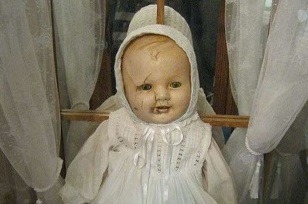
Strange things are afoot at the Quesnel and District Museum and Archives in British Columbia. After acquiring a 1920s-era doll in 1991, the curator felt a little uneasy with the way the baby doll smiled through its cracked visage. The curator later learned that the donor would repeatedly find in the house windows securely latched that, moments before, would be wide open, and hear the eerie cry of a baby coming from the basement—only to find another open window...and no child. These reports creeped the curator out a little bit more. The doll settled into its new digs well enough, until patrons to the museum started complaining about how they felt the doll's eyes were following them as they crossed the room, or that its fingers would move and eyes blink. The doll has garnered national attention for its antics, and the museum welcomes those who are brave enough to stare into the eyes of the broken-faced doll and make their own conclusions of whether it is haunted...or simply just extremely creepy.
5. The Blushing Portrait
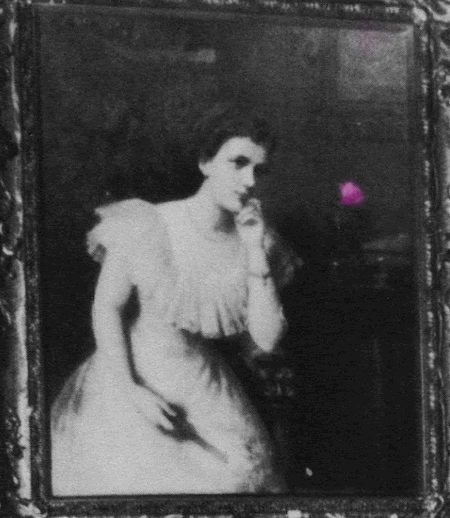
Haw Branch Plantation sits tucked away in the hamlet of Amelia, Virginia. The owner's cousin sent a painting of a young, distant relative who had passed away; the owners, upon receipt of the painting, were disappointed to find the painting a mix of black, grays, and dingy whites, having been told of the painting's beautiful colors in green and pink. Out of respect to their cousin who had sent the painting, the owners placed the painting on the mantelpiece in the library and forgot about it. Days later, women's voices were heard coming from the library, where the owners only found an empty room. This continued until it was noticed that the painting of the young woman was taking on color. Over a year and a half, the painting was slowly infused with the promised greens and pinks, but also revealed a lovely redheaded woman. At some angles, it appears that the woman was blushing but in others it looks as if the portrait was bleeding. Local experts were called in to examine the painting for an explanation, but none were ever able to give a firm and logical answer.
6. Golden Gate Bridge
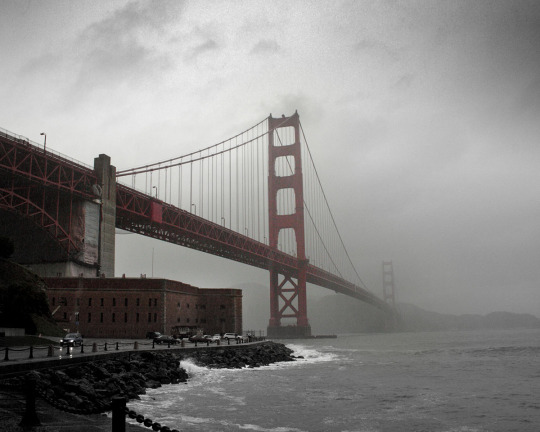
A spectacular tourist spot in San Francisco, California, the Golden Gate Bridge welcomes visitors from all over the world—and leads some to their doom. Named the premier suicide spot in the world (with over 1,300 known deaths from jumpers since its opening in 1937), the bridge has a shadow over its beauty. On nights locked in the fog rolling off the bay, passersby may hear the screams of the jumpers before their bodies hit the water.
The Tennessee ran aground on the sharp rocks on the Golden Gate Strait in 1853. Luckily, all of her passengers and crew were saved before it sank, but in 1942, the crew of the USS Kennison reported seeing the ship sail under the famous bridge and into the fog without leaving a blip on the Kennison's radar.
7. The Screaming Skull of Burton Agnes Hall
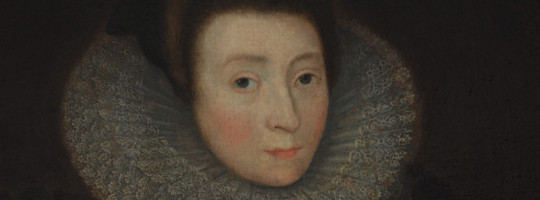
The untimely death of Katherine (Anne) Griffith of Burton Agnes Hall in Yorkshire, England left behind more than a tragedy of a young life cut short. After being robbed and beaten by one of England's notorious highwaymen near her home in the early 15th century, Anne was taken home to perish in relative comfort. Making her sisters promise to always keep a part of her with them, she died wanting to "remain in our beautiful home as long as it shall last." Literal much, Anne? Burying Anne's head along with her body, her family returned to the Hall to discover one very grumpy ghost pleading to come home. Disinterring the body a few weeks later, they found that her head had been severed from the neck and was completely bare of skin or hair. (You have total permission to get grossed out now.)
Returning with the skull to the Hall, the ghost and odd noises stopped until years later, when the skull was thrown away and Anne got her caterwauling on. The family eventually hid the skull within the panels in the Great Hall, and it has been quiet ever since.
8. Belcourt Castle
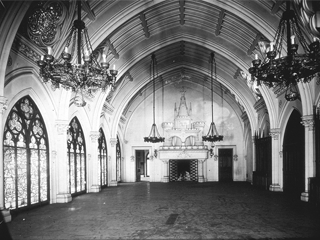
Belcourt Castle in Newport, Rhode Island housed a diverse collection of artifacts from around the world—some just happened to be a little sassier than others. In the French Gothic ballroom, visitors to the mansion have described feelings of unease, a dip in room temperature, and getting the stink eye from a pair of salt chairs reportedly used by French royalty.
Salt chairs were so-called due to the fact that they have a chamber beneath the removable seat to store commodity such as salt and whatever crown jewels they had laying around. Now at Belcourt Castle, the chairs have been reported to repel would-be sitters, and even to have once tossed a person from the chair itself.
A row of suits of armor dating from the 15th and 16th centuries lined the back wall of the ballroom. Each March, the family reported hearing screaming coming from one set of the amour as a knight relived his final moments. A helmet was also rumored to swivel to follow tourists as they walk through the house. Other ghosts in the home include a robed monk, a British soldier, ladies dressed in evening wear, and a Samurai warrior who is believed to have traveled to the house along with the former owner's Asian collection of antiques.
9. Chair of Doom

It's a little on the dramatic side, but with the chair hanging from a wall at the Thirsk Museum, in North Yorkshire, England, you can't be too careful.
Convicted of murdering his father-in-law in 1702, Thomas Busby placed a curse upon anyone who dared to sit on his favorite chair at the Busby Stoop Inn—the same one his father-in-law had sat in the night he was killed by a blow of Busby's hammer. After Busby's hanging, the legend of the chair's curse grew. Locals dared each other to sit in the chair and taunt the curse of a dead man—until a string of accidents made them wonder if they had pushed it too far. First, in the late 18th century, a chimney sweep was found hanging from a gatepost next to where Busby was hung years before. Years later, airmen who had dared the curse were found dead in an automobile accident the same day. More and more car crashes linked the chair to untimely deaths. The pub owner finally donated the chair to the museum after a man working on the roof fell to his death after using the chair earlier in the day.
10. Hollywood Sign

Bright lights and the big city can also equal crushed dreams and a roll down the hill into legend. The Hollywood Sign looms over the sun-drenched valley in California as a symbol of ambition and fame—but what happens when it all becomes too much? Actress Peg Entwhistle felt her career had gone nowhere after she left New York to try her luck in the movies in 1932. Desperate and no longer wishing to be a burden to her family, she chose to plunge off the top of the letter H of the (then) Hollywoodland Sign. The next morning, a hiker found her coat and purse, with the suicide note tucked within, at the base of the sign and left it at the police station. They found the body two days later; it had rolled into the brush downhill. Two days after identifying the body, a letter arrived at her uncle's house giving her the lead in a new production at the Beverly Hills Playhouse.
Now, hikers report seeing a woman in 1930s-era clothing wandering at the base of the sign, only to disappear when they approached her. Park ranger John Arbogast claims to have smelled gardenias, Entwhistle's favorite scent, in the dead of winter. Police have often been called to the sign on reports of seeing a woman jump, only to find nothing but the beautiful view of the valley below.
[Stacey Graham, Llewellyn]
38 notes
·
View notes
Text
CLAIRE DENIS’ WHITE MATERIAL “Nothing’s mine. But I’m in charge.”

© 2018 by James Clark
Sometimes it pays to be ridiculously late. Years ago, I saw two or three of the films of Claire Denis, and wrote them off (figuratively) as overwrought, Grand Guignol melodramas pertaining to the outrageous predations upon Africans. Failing to heed the well-known predilection of auteurs to sermonize bullshit about their efforts seeing eye-to-eye with politically correct dullards, I left that hidden and unbeknownst treasure to pursue the singularities of quite untrammeled sensibility within the wheelhouses of the likes of Wong Kar Wai, for instance (his, Happy Together [1997], recently posted).
Having also been a latecomer to the skills of Ingmar Bergman, there were notions about Denis’ extremities which began to make much more sense. Since her film, White Material (2010), is copiously woven with the cosmic elements to be seen in Bergman’s, The Seventh Seal (1957), that seems to be a good starting point. It is fearlessness, not salvation, being the essence of Bergman’s work; and it is fearlessness, not foreign aid, of the essence of Denis’ work. Therefore, our first step has to do with our protagonist, Maria, tempting the fates by refusing to get away from the collision of rebel and French colonial militia forces in mid-century Africa. At a road on her coffee plantation she is visited by a hovering French Army helicopter, from which the following one-way dialogue screams: “Madame Vial! The French Army is pulling out! We’re leaving! You’ll be completely cut off! Think it over, Madame Vial! Think of your family… We’re pulling out… You must leave immediately.” Madame Vial swishes away as best she can the reddish soil kicked up by the chopper, which resembles a dinosaur, especially its image as a shadow in flight (a fossil), a commotion whose time has passed in a peculiar way. The retreaters shower down many black containers with the words, “Survival Kit,” prominently inscribed. Maria, after lifting one up, tosses it away contemptuously.
Before that aerial, long-distance event, we are privy to her presence in close-up—a performance carefully defining why (for better or worse) she won’t take orders from French rationality. At the film’s outset she seems at her wits’ end, treading along a dusty rural road. A car approaches and she screams, “Pull over!” Aggrieved and more anxious than ever after that rebuff, she does manage to attend to her shredded emotions. She becomes angry and her gait becomes informed with resolve, a march. Then she swings into a jog which soon becomes a marathon flow. Her panache is tripped up, however, by the appearance along that artery of a truck carrying militiamen sitting rigidly and myopically and failing to notice her crouching in the bush along the road. She resumes her run, now in full stride as if mindful of competition needing to be met with formidable rigor, distinct from that of the semi-professionals seated in that truck. So rhythmic is her take-off, that one might imagine her being a master of tuning discovery to notable power. That her mastery is contingent, though, soon plays out when, having brought her run to a cement highway, she hails by gesture, the screaming silenced, an overloaded bus. “Can I get in?” she asks of the driver. “No,” he declares. “No room.” (And therewith the sinuosity of Joseph and Mary, in The Seventh Seal, joins the search.) Some considerate soul on the roof calls out (to the only white to be found), “Hey, climb up here!” Instinctive composure leads her to prefer staying on a rung of the ladder leading to the overflow (and perhaps an undertow). (A ladder being a place of motion.) “I’ll stay here, thanks…” As the cruise resumes, Maria, in close-up, and shaken, measures what her venture means. One meaning we can well discern is her isolation. Also, without a word, she shows us that she has entered a death-trap. A mountain range in the distance infers that her marathon skills have encountered an impossible terrain. (The name-plate on that back of the vehicle, “Tricolino,” evokes a tripartite situation, one facet of that tripling being the three colors of the French flag [and another facet being synthesis, dialectic, the domain of Bergman, and his theme song of the impossible trick]). That the term is placed in a rather careless art deco font perhaps implies that the rigors of fusion making demands upon her have not been appropriately rendered. But, on the other hand, amidst the rattle and roar of the bus, she claws herself back to equilibrium. Seen in close-up, from the interior of the back-seat window, her face is contorted but her hands are large (remarkable for such a slight figure) and sinuous in gripping the ladder. Seen from outside, she now remarkably presents as an uncanny ease. Her mouth is set, her eyes are calm. A view of her right biceps casts her unmistakably as inured to hard physical labor, having a priority of muscularity (with perhaps scant circumspection). A militia jeep brings the flight to an abrupt halt. Our volatile protagonist becomes a study of terror and defeat. She looks around, frantically. Inside, it’s the French-trained trooper, trained in violent arrogance: “Driver. Papers!” Outside, another grey-uniformed, French-chosen, pulled-out-of-destitution public servant swaggers along the outside of the bus and encounters Madame Vial. He demands, “Where are you going?” She replies, “Home… the coffee plantation further down that way…” Having seen a lot of imperious, gallic, Cartesian dominance in his instructors, he proceeds to enjoy cutting her down, as he, no doubt, had been similarly treated on the road to being an effete prig. “There used to be a roadblock here. Did you ever pay them?” The coffee farmer, feeling bound to give an honest account to avoid a Kafka complication, replies, “Yes, I think I did once…” “How much?” the go-getter dictates. “About a hundred dollars,” is Maria’s admission to the free-lance auditor, with an audience to impress. “To those thugs?” he pretends to be aghast. “No wonder they act above the law!” Maria reasons (not her area of impact), “I had to get through… Everyone pays…” Her prosecutor/ highwayman continues with, “That’s what breeds corruption… Because of people like you, this country is filthy…” The military hero waves the bus through. Before he does, the stung target of his insult jumps into the in-fact-not-full premium seating and chooses a space at the back window. She looks out her new vantage point, and we might—in light of the difficult task of blending, in the air—see her on the hook to bring off an impossible trick of juggling, as posed by Jof, the circus caravan driver, in The Seventh Seal. Does her obsequious question, “Can I sit down, Sir?” account for such a creative move?” All around her, the passengers show fear. What made her smile in that context? On the soundtrack, a low, ringing sound wells up as the raw forest grinds by.

The passage we have just witnessed comprises, in fact, the run-up to the saga’s denouement. Her errant smile—to be distinguished from the valid upswings of her balancing act—locates her en route, her coffee enterprise defunct (her having driven her mutinous crew [“You bewitched us!”], with a gun to her head, to a supposed “survival” zone), to reach the blood-bath at the farm and, like the off-kilter in the bus, machete her venal (and yet considerably sound) father-in-law for having, along with her already shot-dead ex, courtesy of the militia, signed-off the property to the venal, indigenous mayor of a nearby town.
As with the work of Bergman, particularly, The Seventh Seal—in a time of lethal plague and venal scheming—it is Maria’s having entered an arena of sensibility tempering “survival” with hitherto discounted wit and grace, which galvanizes this film. Therefore, the eventuation comes at us not in lineal order, but for the sake of heightening the protagonist’s performance of a priority our world seems to be allergic to. The performance of a pair of medieval and middling jugglers, musicians and clowns (in the film from the distant past) upstages an earnest campaign to gain favor from a powerful dictator seemingly rewarding a binge of personal advantage. They turn that trick by way of momentary “vision,” sensuous disposition offering a perspective upon nature vastly unlike “the real world.”
Thus, cutting away from Maria’s being insulted by the pedestrian, stuff-shirt, venomous African cop, we have, from quite a few days before that bilious bus ride, one of her own moments of “vision.” In close-up, she is at her red-soil property, on her dirt bike, and on top of the world. Her face is ecstatic, her head lifted to the heavens, the wind whipping in her hair, and the ferocious noise of the machine only augments her joy. Though we’ve already seen her having been beaten down (just as Jof was beaten down by the barflies in The Seventh Seal) we can call her an “acrobat” of sorts. Jof, you’ll recall, had hoped their baby boy, Michael, would become an acrobat. But not only that, he was attentive to the boy’s necessity of, beyond a flash in the pan, being a “juggler” (a weaver of disparate initiatives, which he cites for being “one impossible trick”). We receive a long take of her visit to those special sources for her to fly with and thereby become a creative partner. Still in close-up, she lifts her left hand and spreads her fingers in contacting a pure dynamic she conveys to be her homeland. Then the right hand tests the current. It leads our eyes to the branches overhanging the road, now a blur, more motion than matter.
This bracing moment, however, was not without its evil. That cut to before the wheels fell off presents the reddish-haired head and shoulders of Maria from behind; but it could just as well have been her girlish son, Manuel, a teenager, spawned with that Andre she once married and quickly left (but also stayed on , as the only business person on the plantation). (Could there be something called a Californian Frenchman? When Andre uses that bike, it’s Easy Ridertime, also into death, by way of mawkish, sluggish self-adoration.) That Maria has made impressive inroads into creative action is not in question. That her accomplishment is glaringly incomplete—and nowhere more sordid than tolerating, even celebrating, the inertia of Manuel—is also a certainty. And “white material,” with its spray of connotations culminating in the factor of the skill of Maria, is all about having or not having—as with Bergman—what it takes to be a human (to master the “impossible”).
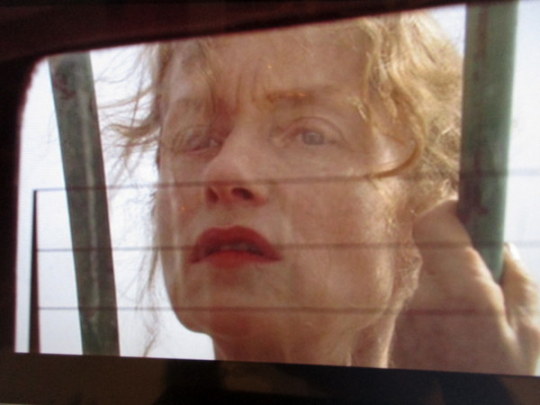
In the course of her seven-day work weeks, she (needing to replenish workers in face of the rebel threats against white enterprises and the questionable militia form of law and order) hires a new crew-boss who tells her of his young daughter being sick. Maria asks what’s wrong, and the new recruit can only say, “She’s in bed. She doesn’t move.” Maria recommends the clinic and he tells her, “It’s too late now.” That could be Manuel. But her self-importance (her competence in the fields being in direct opposition to her parenting) finds her stymied to act upon that responsibility, a stasis not touching the type of juggling being part of her strengths. She falls asleep during her dinner on the patio late one night, the night she brought her crew back to full strength. Her dream concerns a social visit to the mayor, a family man, surprisingly enough (but then his leaning had always been about advantage for the sake of domesticity, and the wider ranges of survival). “He’s [Manuel] grown up,” the host declares. It’s not just that. His mind runs all over the place. He’s become a dog…”/ “Insane,” Maria agrees. (That civic dispenser of blame surfaces as a measure of tone, not narrative progress, in a scene where Andre proposes to sell the farm [insolvent, it turns out to be, despite Maria’s strivings]. The mayor’s little daughter pops up with a bottle of Fanta, her favorite. Stolid sobriety, and infantile fantasy. The world in a nutshell; but not, despite slippage, the world of Maria.) “You botched it with him,” the voice of reason maintains. You didn’t finish the job.” (Very true. But her finish is light years away from his.) She laughs cynically, in face of that defeat.
The “insanity” of Manuel functions here, beyond the display of the protagonist’s dismaying dividedness, as a recurrent amazement to Denis that sadomasochistic rampage flits across the appetites of a tasteless (Fanta-prone) populace. Maria—spurred to do something about Manuel’s sleeping far into the afternoons, by Andre’s new partner declaring that her son from Andre is “different” (superior) to Maria’s sluggish output—forces entry to the bedroom and insists on his showing some sentience. In response he goes to the pool in the yard and floats on his back like a diseased seal. The silent, decisive, self-contained marathoner shrinks to the likes of, “Manuel, get up! How can you sleep all day in bed? I don’t know what to do. You disappoint me… Nothing interests you. You loaf around all day. We can’t talk. It’s like we don’t exist… I’ll send you to France. What happened? I can’t believe you’re my son. Losing a crop is worse than a fire. Letting your self go is the vilest thing a boy can do. It’s loathsome!” After she leaves to take up once again her (relative) success story at the coffee fields, two of the rebel children soldiers now drifting about the property in the absence of direction from their leader, “the Boxer,” mortally wounded and finding sanctuary of sorts in one of the plantation’s out-buildings, come close to harpooning Manuel as he does absolutely nothing but leak incoherent venom. Andre chases them off and pampers the “not different” son. “It’ll be fine, son, you’ll see” [Andre’s counting on the mayor to follow up on the promise of escape in exchange for the business being as delicate and dull as his figurine boy].
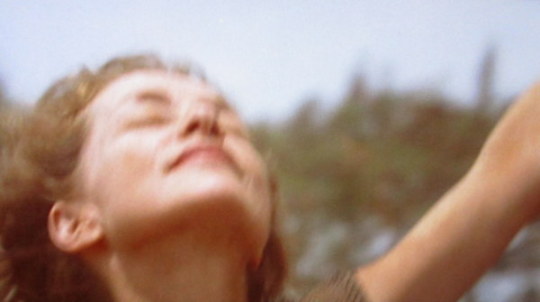
The detour through the mayor’s office prepares for the prize-fight imagery to come as further sealing Maria’s darkening fate. Andre’s fatuous rationale to Cherif, the mayor, as to squeezing Maria out of the business and out of the monies left, “I’m protecting her from herself,” comprises a prelude to a spate of cat and mouse. “I’m glad to hear the plantation is worthless. I keep you alive. Without me you’d be rotting on the Garonne” [river, in France]. It’s a nice piece of land, but still, if I add up everything you owe me, I should first of all seize the plantation; and second, kick you out! And you’d still owe me and the government.” To provide additional nightmare, Cherif (almost “Cheri”) points out to Andre his “personal militia,” a group of bath house devotees. When Andre laughs, “Come on, spare me!” the family man/ politician prompt his bodyguards, “Anything to say?” “Yes,” they call out. “What is it?” the cheerleader prompts. “Knock down the rebels,” they chime, and they preposterously assume triumphant gestures.
Andre tells Maria about the close-call at the pool. “Two kids with a machete and spear…” Impassively she replies, “I’ll tell Jean-Marie [a previous crew-boss] tonight.” When the ex persists, “Those two kids were strange, threatening… attacking Manuel,” all she says is, “I’m going” [back to the microcosm and back to squelching the macrocosm]. Those trespassers soon show up again, wandering through the house with their hard eyes, and coming across a print showing medieval soldiers with hard eyes, consigning a “witch” to the stake. (Hello, Mr. Bergman. And your doomed witch and all that jazz, and malignancy, from The Seventh Seal.) Though our protagonist puts up a front that hard eyes mean nothing, her finding interest in the imagery of sadistic persecution reveals that it has, on occasions, anyway, occurred to her that the unfinished business of juggling needs attention. (Andre tries to get through to her that she won’t be able to sell the coffee now. But she cuts him off with, “You’re getting defeatist.”) Manuel is at home and he actually wakes up to see the invasion (though he is too late to see one of them find and pocket Maria’s handgun, salted away amidst her panties). The kids rush out, cackling like chickens, perhaps cock-fight birds. And Manuel, in this regard like his mother, discounts the violence overrunning the moment. Quaffing down an entitlement long past its expiry date, he pursues the primitive cynics. That he pads along, having not thinking that footwear might be necessary, cues up a soundtrack of that growling tone heard earlier. The undisciplined but advantageous squawkers see a new form of combat arising when Manuel cuts his foot. Taking off his jersey to mop up the blood and brush away some of the mud, he limps forward; and his “prey” sees him as an easy prey. Soon a machete is at his throat and Manuel is pushed to his knees. Now, at last, he realizes that the skinny adversaries will enjoy displaying that they are more powerful than he is. One of the illiterate boys cuts off a swatch of the truant’s locks, and then he sniffs the hair he holds in his hand. The arrested spear-thrower runs his hand over Manuel’s would-be bad-ass Gothic tattoos. “Yellow Dog,” the machete- and gun-totter sneers. One of the effectively bad-asses rips off his gold necklace. The machete blade returns to Manuel’s throat as his combat career seems to be at an embarrassing end. A German Luger gets loaded up and both of the black sociopaths shoot into the air while the white sociopath stays petrified on his knees. Manuel’s jersey has become a flag—a red flag of rebellion, but also a white towel of surrender.
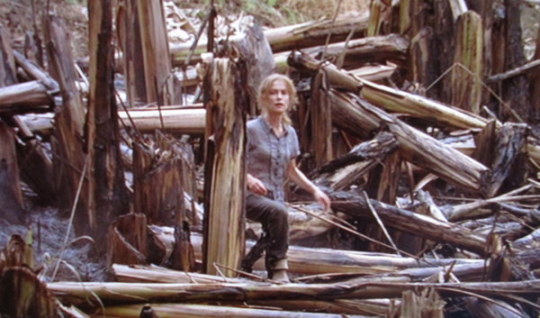
This episode has an extension by way of the scuttlebutt hovering around the source of the homicide, namely, “The Boxer,” (who turns out to be crew-boss Jean-Marie’s nephew), and a fan, no doubt of boxer, Mohammed Ali, who performed in Africa at that era. Like “Gaseous Cassius,” he has covered himself with a mystique of superhuman imperviousness to pain and his branding includes nifty murals showing himself always a winner, flexing his muscles as if having just won a fight. (The flexing of Maria’s muscles had been far less focused and yet far more valid.) In contradistinction to the mayor’s “fighters,” babbling about “knocking down” the upstarts, one of those posters persists near the mayor’s bailiwick, a portrait including the supposedly up and coming leader with a red star on his cap—part of the off-shore borrowing by which the self-styled salts of the earth expose themselves to be uninspired. Though the opening moment of the film shows him on is back, having died from a gunshot wound (militia men cautiously enjoying the loss), we come to see in the prequel a stoic but less than heroic fabulousness. His devotees may prate about his invincibility, but we first see him (when alive) hitting the ground (as if by a plague) to avoid a truck full of underlings in the service of the French military, still in control despite rhetoric of liberation and self-determination. On his way to find a hide-out on Maria’s land and Maria’s sheds, he mounts a horse having been wandering on the property, and with his hoody he resembles a medieval soldier, recalling Block and Jons and their baggage, in The Seventh Seal. The plantation church he passes posts a sign, “God Doesn’t Give Up;” also, a cock struts around. Here he is noticed by a fan, and the discovery soon finds its way to the largely tiny army. The adult in charge childishly celebrates, “I knew it! They can’t take him down! If I could meet the Boxer, God could do no more for me! No KO’s!” Then a cut to the Boxer’s bleeding gut. Another cut features Maria calling out to Manuel, “Get up, Manuel, please! I need you!” The bedroom door is locked. Then she goes on to notice one of her sheds unlocked. There she meets the Boxer who is lying down but not as inert as Manuel. She asks, “Are you Jean-Marie’s nephew?” On hearing her guess was right, she asks, “Does he know you’re here?” The nephew (suddenly becoming less than huge), looks to his swollen reputation, by way of, “He’ll be glad to see me” [the awesome celebrity]. She offers him a drink of water and some rice in a bowl. Closely following this hiatus, there is Maria berating the staff for its “pulling out.” “You don’t get it! You let them scare you!” [in the back of her mind she knowing herself to be pretty tough—tougher, more regal, than the Boxer; but, as we well recognize, foolishly, which is to say, weakly, overestimating her strengths]. A pirate radio DJ cuts in, quixotically devoted to reggae, not African music, and he emotes, “Listen to my words, fearless young rascals. The Boxer is back! He’s in hiding. Go find him. Go out there and find him!” Another communique, even more fevered than the last, reads, “Some have walked a hundred miles in search of the Boxer…”

The two little punks, loosely linked to the slipshod “revolution,” had been bright enough—clever in their endless delinquency—to choose restraint in delivering punishment to a victim and thereby avoiding consequential punishment to themselves. The brush with violence had left the clueless Manuel stripped to his underpants and frozen by the danger and humiliation, staring at the unforgiving scrubby turf. Andre comes along, and for the second time sends away the lively incidence of plague. He and the straw-boss provide some clothes, and Maria is nonplussed but not visibly shocked or dismayed (her temperance coinciding with the slipperiness of the punks). She and the paid troubleshooter inspect a hole in the fence. She says, “It’s been like this for months.” Then, after looking for footprints, she declares, “Must be young shepherds…” (That could be an ironic reprise of the rapist-murderers-shepherds, in Bergman’s The Virgin Spring [1960].) Manuel and Andre are card-carrying sheep. But Maria, the centre of gravity here, is much more difficult to assess. Manuel unconvincingly tries to maintain he hurt only his foot. (The assembled burly, balanced and adult breadwinners/ farm hands witnessing the ridiculous coward being given a ride home constitute a silent jury.) Though he soon hops off the truck to get going on a pathetic rehab, he has been captured for us as a rendition of the retarded “witch” in her tumbril, burning by consensus, in The Seventh Seal. As the war and the plantation go up in flames, what remains of Manuel is shown by a quick cut of his head reduced to something close to a scorched potato. For a real rally, there is Jof, in the aforementioned film, having been humiliated by a savage mob; and riding high at the end of the saga. That recurrent, ominous ringing tone during the carriage-trade send-off of Manuel leaves no residue of musicality upon Maria, in pathological denial about weakness needing to be checked, lest sadism prevail. “This is nothing,” she says, of the slip in the field. He is nothing, per se. But he and his ilk are an essential element requiring ruthless alertness.
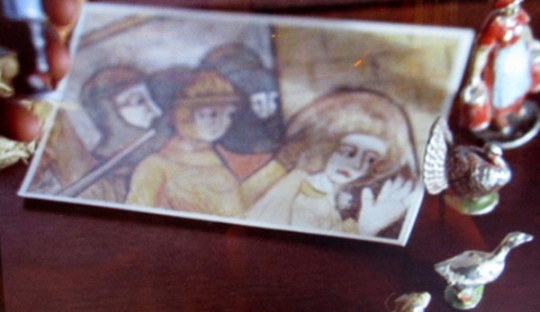
Having left the truck, the loose cannon rushes home to shave his head, take a shotgun, abuse his step-mother (bound for the encampment without a clue), and joins the children’s army where he is but one of very many slaughtered by the militia in his stone-castle-like home. The optics of his demise are part of a rich study of physicality in a time of protracted presumption, a time where no one—unlike the players, Joseph and Mary, in, The Seventh Seal—devotes sufficient energy to acrobatics and juggling. (In his new provocation of lousy theatre messing with the protagonist’s equilibrium, Manuel coincides somewhat with lousy playwright, Minus, knocking off the equilibrium of Karin, in, Through a Glass Darkly [1961]). The tiny rebels had been instrumental in shooting up the local pharmacy and absconding with a remarkable number of tiny pills for every occasion. Their display, among which of course included Manuel, of gobbling down chemical aid like ravenous birds in a berry patch, strewn over a swatch of mud after readily solving the baby screw-caps, gives us a taste of the decidedly trivial political red herring this production has mounted. (For those who can never see any farther than politics [as complemented by science, religion and humanitarian morality], as the route to humanity, this film will forever be shuttered.) The “rebels” experience high confidence from their murderous theft; but real playfulness, real delight, does not come close. Before he’s shot dead, his body dragged from his ham-radio studio, the DJ had told the world, as far as he could see it, “Herbs to tone those flabby muscles, and render you invincible and invulnerable…” (This time Haight-Ashbury—as Jamaica, before—becomes a beacon with no light.) Maria, hearing this recommendation with no confidence, recalls her bus ride after the insult, and her being at a loss, lacking the muscle, her bicepts notwithstanding. The survival kits and the order to leave that world offends her risk-taker’s spirit. But her misreading of advantage slams her closer to Manuel and Andre than she should be.
The exuberance of this catastrophe plays out in a supplemental rain of cruel irony. Necessities capable of burnishing the protagonist’s resoluteness fall like ash in her hands. She beholds a Toyota loaded down for the sake of surviving the conflict. And though she feels nothing but disdain toward what she proudly regards as squeamishness in others, she is readily duped into childish, skittish, toy-like thoughtlessness, including disregard for the malignancy on the ground nearby and the malignancy all over the planet. The large, cinderblock homestead tranquillizes her—as did the stone castle of Antonius Block and his guests, in The Seventh Seal—to the extent that such an edifice and its concerns must be too big to fail. One of her longest-staying workers, Angel, now about to cut and run, has a life-sized wooden figure of a man on her worker’s veranda. (That would coincide with the large, inert sculpture on the veranda of a beach house being abandoned in Bergman’s film, Persona [1966].) Inside a meal of fresh vegetables is on the table. But the door is locked. (Block being denied the substance of heaven. Maria being denied, due to failing as an acrobat and a juggler.) The close-formation of the many cyclists abandoning the farm evokes the closely-linked dance of death by Block and his retainers. In her disappointment Maria wanders to an area of the property being impassible due to a mass of shattered tree trunks. In the Bergman film, Through a Glass Darkly [1960], a woman disappointed by her mojo leaving her, hides in the wreckage of a big wooden fishing boat. Her next step consigns her to a mental hospital. But with Maria, the tone is, “Maurice [Angel’s husband], we don’t need to be terrorized. We can fight back!” She runs into a rebel roadblock and has to pay to proceed. The point, however, has to do with the leading gunman having been Manuel’s gym teacher. The real drama being, what kind of athletes are stepping up to the plate? Similarly, when Maria visits the pharmacy for the grandfather’s medications the (soon-to-be murdered) pharmacist tells her, “It’s all here, except for the oxygen…” Seen, as so often in close-up from behind, Maria overhears the DJ’s pep talk to the converted. “Many things are to be found in Mama and Papa’s house. But go about it gently. Everyone is entitled to his share. And don’t ever forget what fate has in store for us … No one can take away your share. Beware of imposters…” Does Maria have any inkling that her excellent career could be tainted with imposture? The radio gate mouth goes on to a fact of life; but not a really significant fact of life. “As for the white material, the party’s over!” Showing the ropes to the new workers, while the “young rascals” are on a roof cutting the power lines, she blithely explains, “The power goes out often…”
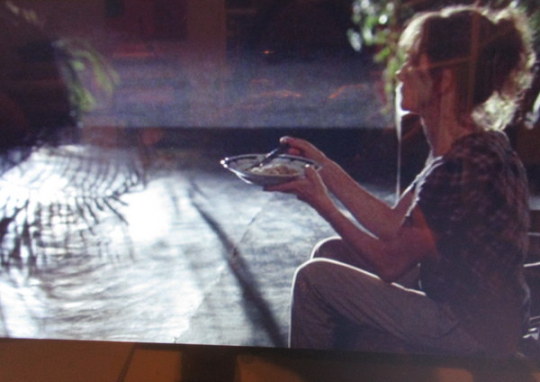
With Manuel shaved down as he was in the prologue—shifting and crouching desperately in a nearly pitch-dark interior—he in fact shared the flickering launch with a pride of cheetah bounding across a road on the plantation. This spike of bemusement comes to clarification, later, regarding the early and unlamented death of someone who was dead to the world anyway. In the trajectory of that binge of fruitless go-pills, we see a wobbly Manuel on his domain encountering two, no-nonsense militiamen, training their rifles on his empty head. But, wait a minute, those gunslingers have turned out to be brimming with nonsense, in the form of cat and mousing the chump in that darkened place kicking things off to set a bilious tone. The cats then torch the mouse and the whole mouse-pack; but not before exacting a gory slaughter. That’s where the real cats come in, to put everyone to shame, including Maria, who would have got caught up in the sadistic frenzy—rather aptly, in fact, now operating, as a second front of massacre and becoming an Angel of Death, or, if you prefer, a carrier of the plague which will always be with us.
After her pampering and loading on the truck the flabby boy having shown what he’s made of—“You’re my son. I can’t let you drift away…”—a cheetah by the road silently and expertly cuts the crap. In that interview with the Boxer, she tells us a lot. He asks, “Why didn’t you leave with your son?” She answers, “I’m a good fighter, too… How could I show courage in France? [but real courage being not a display of advantage]. It would be absurd, no rhyme or reason [how, then, is she doing with deep musicality, in Africa?]. I’d slack off, get too comfortable…” And here she is, giving a quick and comfortable rundown to the new, and last, crew: “Nothing’s mine, but I’m in charge.” One of those grounded laborers she could have learned something important from, tells her, “If it’s not yours, it’s just smoke.”
1 note
·
View note